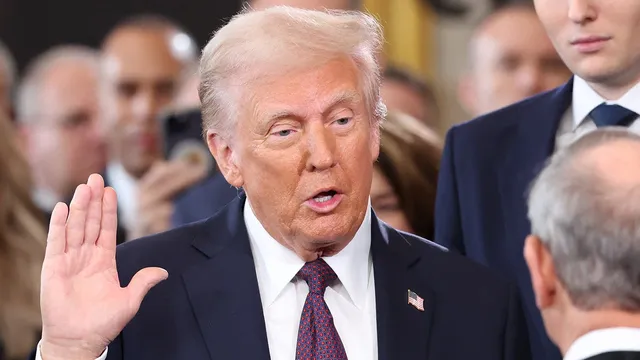
Trump marks 100 days back in office with celebration in Michigan
2025-04-30 12:14- President Donald Trump is celebrating his first 100 days back in the Oval Office with a rally in Michigan.
- Amidst a significant focus on immigration and economic policies, he has signed an unprecedented number of executive orders.
- The administration seeks to bolster support through this rally, addressing mixed public sentiments about Trump's governing priorities.
Express your sentiment!
Insights
In the United States, President Donald Trump is set to commemorate his 100th day back in the Oval Office with a rally in Michigan on Tuesday. This significant milestone occurs during the administration's 15th week, amidst a series of activities aimed at showcasing Trump's ambitions in his second term. His presidency has already seen a high number of executive orders, more than any president in a similar timeframe since Franklin D. Roosevelt. The president emphasizes his legislative priorities, focusing on border security, economic policies, and discussions surrounding tariffs. The upcoming rally in Macomb County is positioned as a platform to celebrate what the Republican National Committee has termed Trump's 'legendary start' to his presidency. Furthermore, this week carries particular importance as Trump aims to boost public support amid mixed reactions regarding his focus on immigration, economic strategies, and executive powers. He faces challenges from Democrats who are critical of his policies, particularly regarding immigration and social issues. Trump's agenda's reception continues to fluctuate, with polling indicating dissatisfaction among even a segment of Republican voters over his prioritization.
Contexts
The impact of Trump immigration policies has been significant and multifaceted, shaping the landscape of immigration in the United States. These policies, characterized by a focus on strict enforcement and reduced legal immigration pathways, have led to a decrease in the number of individuals entering the country, both legally and illegally. Throughout his presidency, Trump emphasized the construction of physical barriers along the southern border and implemented measures aimed at detaining and deporting undocumented immigrants. His administration pursued a zero-tolerance policy, which resulted in the separation of families at the border and heightened fears among immigrant communities, even those with legal status. This created a climate of uncertainty and anxiety, particularly for those awaiting immigration decisions or protections under programs like DACA (Deferred Action for Childhood Arrivals). Moreover, Trump's policies have dramatically affected the refugee and asylum systems in the United States. By drastically reducing the annual cap on refugee admissions and instituting a travel ban affecting several predominantly Muslim countries, the administration shifted the U.S. stance from being a sanctuary for those fleeing persecution to one of increased restriction and scrutiny. The asylum process was also fundamentally altered, with new rules requiring those seeking asylum to remain in Mexico while their claims were processed, creating logistical challenges and exposing applicants to further dangers. The effects of these policies extend beyond individuals seeking entry into the U.S., impacting broader societal and economic factors. Limited immigration has had repercussions on labor markets, particularly in sectors that rely heavily on immigrant labor, such as agriculture, construction, and hospitality. Many businesses have reported difficulties in finding sufficient workers, leading to increased wages in some sectors but also to potential slowdowns in economic growth. Furthermore, these policies have sparked significant public debate regarding their moral and ethical implications, with many advocating for more humane treatment of immigrants and the need for comprehensive immigration reform. In summary, Trump immigration policies marked a pivotal shift in U.S. immigration strategy, emphasizing enforcement and restriction over facilitation and support. The impacts of these policies have reverberated through various aspects of society, creating challenges for individuals, families, and businesses alike, all while inciting intense political debates about the future of immigration in America. As these policies continue to influence ongoing discussions and reforms, it will be essential to consider their long-term implications on both the immigrant communities and the fabric of American society.